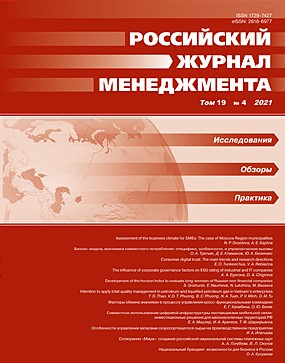Dеvеlорmеnt of the horizon indех to еvаluаtе lоng-tеrmism of Russiаn non-finаnсiаl companies
DOI:
https://doi.org/10.21638/spbu18.2021.405Abstract
Short-termism, the firm’s following strategic management practices for short-term, restricts investment in physical and intellectual capital. Investors and managers should identify and counteract such practices in a timely manner. However, existing academic and practical studies overlook problem of short-termism in emerging markets, lack reliable metrics of short-termism or consider only financial indicators in existing horizon metrics. In this paper, we closed some research gaps and constructed the relative horizon index which evaluated strategic focus of public non-financial companies from various industries. We also performed empirical study of horizon index on the sample of 50 Russian non-financial companies over 2014–2019. It revealed that the energy and utility segments in Russia have the largest share of long-term oriented companies, while the industrial, real estate and consumer goods segments have a significant share of short-term oriented companies. The former is explained by: the significant need for modernization in these sectors; developed corporate government systems of firms; limited incentives to accounting manipulations; and a diverse set of stakeholders. Conversely, the latter is underpinned by low levels of investments in comparison to depreciation of real estate, industrial and consumer goods companies. It is also driven by higher incentives for these companies to play with accounting ratios. We showed that the long-term strategic orientation of the firm is not immediately realized into stable positive economic profit patterns over time. However, there is strong and positive correlation between the firm’s decision to follow long-term strategic orientation and the value of multi-period growth in firms’ economic profit. The results can be used by investors, analysts and asset managers to screen the companies on the subject of their following long-term value creation principles and to compare the ability of the firms to sustain positive economic profit.
Keywords:
horizon index, long-term value creation, economic profit, strategic management, short-termism, management myopia
Downloads
Downloads
Published
How to Cite
Issue
Section
License
Articles of the Russian Management Journal are open access distributed under the terms of the License Agreement with Saint Petersburg State University, which permits to the authors unrestricted distribution and self-archiving free of charge.





